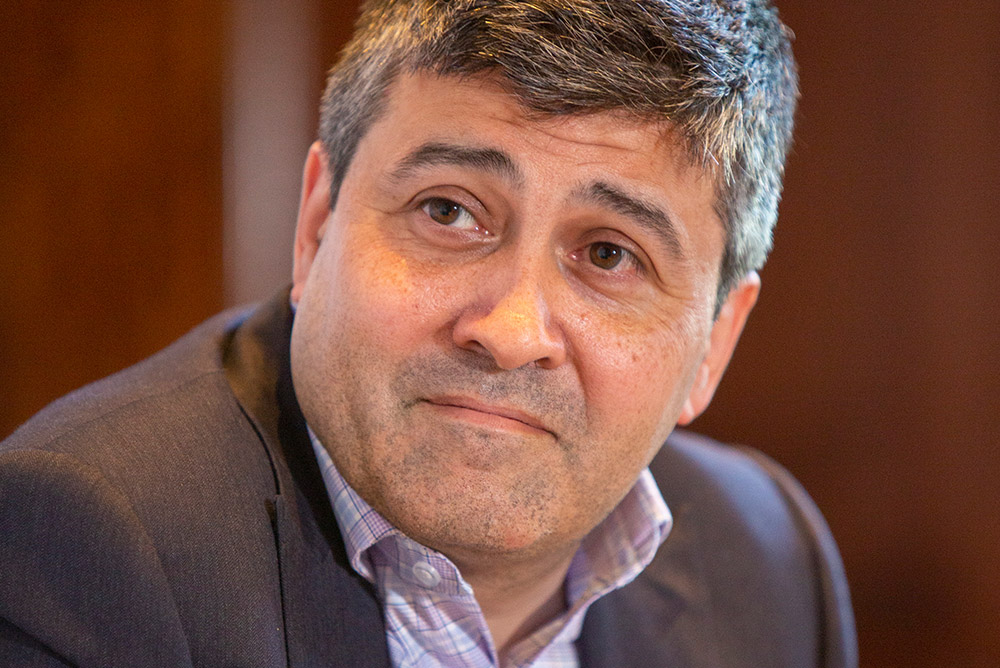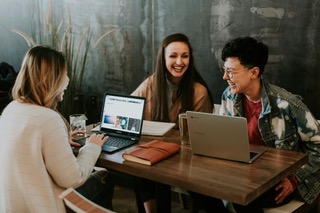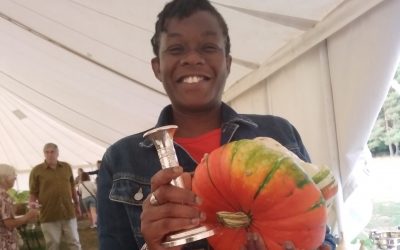A think tank and charity that sets itself apart by actively engaging with individuals who are reluctant about societal change, alongside those who champion it.
‘Its about being integral to the society you are a part of’
In this interview, Noha is in conversation with Sunder Katwala, the Director of British Future. In Part One of this interview, Noha and Sunder cover the origins of British Future, Sunder’s thoughts on immigration and integration, and the challenges of having a productive dialogue on social media.
British Future
1) Just to start off, could you give me a brief background into the origins of British Future and its purpose?
“British Future is a charity and think tank. Its mission is that we want Britain to be a confident, welcoming and inclusive society. So, hopefully, everybody would agree with that. Our objective is to be distinctive about the way in which we work, as we’re interested in working with people who don’t feel as confident about change in our society, as well as with those people who do feel confident about it.
We’re interested in finding the common ground between people who are very positive about change and the people who are anxious about change. What can we do to say, ‘Well this is a society we’re going to share; how does that affect the way we feel?’ And we try to do that, therefore, on some of the issues that are most divisive and most polarising. Such as immigration, integration, race relations, opportunity and fairness. We try to pick those hot button issues that people are anxious about, scared about or worried about. We try to apply that approach of bringing people together and talking to people about what’s underneath those issues and looking at where we can take that.”
Bridging gaps through conversation
2) These topics that British Future have picked out frequently make headlines, they’re discussed on a national and even global level. But it seems like British Future places great emphasis on having local conversations, what is your thinking behind that?
“I think we want people to feel that it’s an open invitation to be involved and so you have to get to where the people are rather than make them come to you. But I do think we want to focus on the fact that these are national, as well as local, conversations. I mean, one of the features of our society is that people tend to be pretty confident about the neighbourhoods they live in, the towns and cities that they live in. But they tend to be more anxious about the national conversation we’re having. People see those national debates through what they feel is going on close to home and often that confidence about the place where you live doesn’t always extend five miles across town. So it’s often the case that people can see change happening but feel distant from it and maybe threatened by it.
We understand a lot of people talk and think about these national, international and global themes through a local lens. But in a way it’s not enough to make people feel like ‘I like my neighbours’ if you don’t also give people a sense of who they share the country with. And there are quite big differences in age, of perspective, of ethnicity, of faith that are not too far apart in our country and we’d like to bridge those gaps for them.”
Focussing on integration
3) Focusing in more on one of those specific topics, what does it mean to be integrated in Britain? How do we go about defining that?
“It’s a great question. I think if you’d talk about immigration, most people have a view and they know what you’re talking about. They may be positive about it because it links to their own family history or they might not be because it’s something unfamiliar.
However, if then I talk about integration, people might start asking me what I mean by that. So we’ve got a theme here between these topics that is concerned with how we live together, what it means to be part of a society together. But we’ve actually got a different set of languages: integration, identity, multiculturalism, these terms are quite abstract and people don’t know how to pin them down. I think integration is a good value because it contains the idea of being integral, because it’s about being integral to the society you’re a part of.
There are two things which I think are important in determining whether I can see myself as fully part of the society I live in. One would be surrounding the issue of equal opportunity: in education, in jobs, in all sorts of things that you can measure and produce statistics on. For example, if I succeed in education am I still able to get interviews? So I think the issue of equal opportunities is a fairly concrete topic and is quite familiar.
But I think there’s a version that’s parallel to that which is ‘Do I feel I have a full say in who is British, who is a Londoner, who is from Essex?’ and so on. Do I feel that? Am I allowed to feel that? It’s not only about other people but do other people feel that about me? So I might have felt, when I was a fifteen year old, that I was as British as everyone else. But other people had said ‘Well you’re not really Sunder, because your Dad is Indian and your Mum is Irish. So you are a bit and we’ve got to accept you’re here now. But you’ll never quite be as British as me.’ I mean most people wouldn’t say that to you but you might pick up that people feel that about you because of your faith or ethnicity and so on.
And so, it feels to me that a society where that is true, that you feel like a full member, a full citizen of any background, that to me is what an integrated society is about. Obviously, different people would have different views about that. Some people might say it’s more difficult for someone for a minority background to be integrated. Others might say it’s actually easier for people from a minority background to be integrated as they get all the attention from politicians and that it’s actually harder to be white and working-class and feel integrated. And so we need to ask, okay, what is making people feel unheard or left out? What would make them feel ‘Actually, my voice counts.’
There’s a deal there for me, which is that, for someone to respect me, I am going to have to respect them. And we might take some time in dialogue to work out where that ground is. So that would be my definition of being integral, it’s equal opportunities but it’s also equal status in the society you live in.”

The Immigration Debate and the Future
4) I want to pick up on what you mentioned about how everyone seems to hold a pretty certain position on immigration. When we talk about immigration, we’re talking about quite a few things: policy, borders, culture, economy, social fabric etc. In your panels, how do you advise talking about immigration given how many components it breaks into? Should we be talking about these components in relation to each other or separately?
“This is something we had to grapple with from the start. People often thought the immigration debate was about immigration and that’s partly true. So, you’ll hear people say ‘Oh if we have an immigration debate, let’s look at the statistics regarding the economy to see if migrants are taking jobs or paying taxes. Maybe people want to know about that.’ In 2004, when there was lots of Eastern European migration with people coming to work here, the debate concerning asylum seekers and refugee issues very much became about work and jobs. Yet, the immigration debate moves around a lot. In the meanwhile, there is always the view of people who don’t trust the government, who believe they aren’t telling the truth and think they aren’t allowed to participate in that debate.
When you check, although some people have got an issue surrounding immigration policy, what’s really going on underneath this is a set of ideas about themselves and their country. Really, it’s a set of hopes and fears about society and their sense of voice. In a way, many people’s views of what we should do about immigration next year will depend on what has happened in the last fifty years. What they think of what are now British minority ethnic communities that they perceive are a product of immigration. If they feel that they are in a town or city where that has gone quite well, you can then have a conversation about what has gone well. Though if people have thought that immigration has gone disastrously in their town or city, then it’s going to be hard to get them to say if they want a reform to the immigration policy because that isn’t really the point. Their issue is about who they’re sharing their society with and whether they know them or not.
So, I think working out that we’re talking about all these things at once when we talk about immigration is key. By bringing forward the identity and integration aspect that I think are fundamentally there but harder to find the language about is important.
The reason we’re called British Future in the end, rather than something like ‘Migration Conversation’, is very much about two ideas. The first is the emergence of those issues that came about as a result of immigration but are now separate, such as identity, race relations, integration and faith. We’ve got these issues about Muslim communities for example, that came about after 2005. But the responsibility to sort out these issues don’t fall on minority communities but are issues that are for British society to sort out. So, we want to signal that these issues aren’t a minority and migrant conversation but a British conversation, hence British is in our name.
Secondly, the question we want to ask is ‘Can we agree about the future?’ because, to some extent, we can’t at this point agree on the past. Maybe people make different decisions about what happened ten or twenty years ago or even centuries ago. We have different views on whether Britain should have had an empire and what they should have done post it’s dismantling. But we can’t change that past, we can talk about what that past has meant for people whether negative or positive. But we have decisions that we need to make about our future. And in that way, we can’t rush these decisions we make.
But my distinction between someone who is anxious or even angry is whether they are engaged. If I ask ‘But what should we do now?’ and they have a response, I am interested. If I say ‘What should we do now?’ and they say ‘Well, this community should never have been let in seventy years ago’, I can’t get anywhere if someone tells me what should have been. But if I ask ‘Okay so we’ve got this issue, what can we do together as a society?’, I think that separates the people who have got anxieties but are also interested in the conversation I am having. Very few of those people are people who want to be proved right, who want to see their country fall into disarray. I think the people who want to talk about the future are much larger.”
The media and social media
5) Given that British Future is focused on engaging people who are open to dialogue and opening people up to dialogue, I want to ask your opinion on how we see these dialogues play out in the media. I find that there is often a criticism of the media and social media deliberately making these dialogues polarising and perhaps because they are even capitalising off these divisive issues. Is that an opinion you would agree with?
“I think that the media dynamics and the social media dynamics are definitely a big challenge for the kind of agenda that I am trying to outline here. It’s one of the reasons that in the end, we committed very strongly that we needed to go talk to people everywhere. I could produce opinion polls and find that some people have strong views here, others there and a lot of people were mixing and matching. But the politics of referendums such as Brexit or Scottish independence mobilise those with the strongest views and crowd the rest out.
That was part of the reason why we did the ‘National Conversation on Immigration’. It was a very interesting exercise. We went to sixty towns and cities across the UK. Sometimes we were having the same conversation such as compassion towards refugees and sometimes we were having very different conversations. Obviously, depending on the region, people had very different opinions. But this proved, and we came back with this to the politicians and journalists, that most people are balancers. Most people said ‘I see gains and I see pressures too, what should we do?’ Of course, there are people who will always have a completely positive view on immigration and there will always be people who are angry. But most people aren’t there, so we had to ask the question of ‘How can we break open that space?’
The internet does make the answer to that question much harder. We did an experiment during that exercise by having an opinion poll amongst these local areas, with civic stakeholders and others to determine what their views were. We also had an online survey open the year we were doing this and ten thousand people took that. In both the opinion poll and the survey, the first question was ‘Give immigration a score from one to ten’. From the poll, the most popular answer was five out of ten. And a lot of people justified that by giving an example of what they thought was positive about immigration and also expressed a worry.
In the online survey which everyone could do and everyone could share, no one had said five. Many of them said one out of ten and many said ten out of ten. That’s because they weren’t just taking the survey, they were also sharing it on social media. Knowing we were going to share the results, some of these people then shared the survey with like-minded people who all scored the question in the same way. Meanwhile, those balancers might not have even come across the online survey or might not have had the time to do it because they were too busy with the school run!
It’s very difficult on social media to say ‘I’ve got this opinion that I’m not so sure on, can we talk about it?’ because that’s not the dynamic. So, this happens on all the issues. Also, I find this actually affects the politicians because they say ‘I don’t care if there are moderates, I’m being shouted at by all sides, so I’d better pick one!’ I think this is something we’ve got to work hard on, to work out how to move past this. The majority of people aren’t just people who don’t have their mind made up, it’s people who want to talk about this matter or can be engaged with.”
Working out what’s fact
6) To continue on the subject of media dynamics, how do we deal with the new phenomenon of not being able to agree on what is true? As you’ve mentioned previously, we can’t just throw facts at a person and expect their views to change. Though now we are dealing with a situation where many of us can’t agree both on the past and now on present truths. How do we go about asserting what is true and literal fact in these debates?
“I think we’ve been very critical of the idea that you can just myth-bust your way through a debate. Though people still respect experts, we’re seeing that in Covid. People want to know what the science is and what the experts are saying. But they want their questions answered, not that they necessarily want the scientists to tell them what to think.
You might want to know about what the Economist thought about the European Union referendum but then you don’t want the Economist to say ‘Well if you don’t vote like we are then you must be foolish.’ because you can have your separate reasons. You can’t just throw facts at each other as ammunition but we do tend to use it in that way.
There are people who do distrust the media and the newspapers. I think the only thing we can do is to make people more sceptical about why they are hearing what they are hearing. Of course, you don’t then want people so sceptical to the point that they can’t believe anything at all. You want people to retain some trust in good solid information that is coming from other people without an agenda. But I think you’ve got to have those critical thinking skills.
I think it is difficult for people. When you tune in to debates, for example, they are under the law of the broadcaster. You know, if you’ve got someone who thinks ‘A’, you’ve got to find someone who thinks ‘B’. That is something you do have to have in a party debate for a general election. But in the debates surrounding climate change, racism and so on, the broadcaster has to actively decide what the ‘A’ and the ‘B’ is. So I think, to some extent, some of that failure of facts is a result of people feeling as if they are just being lectured to what the question is.
You’ve got to be able to listen to a person’s perspective, whether that comes from feeling or pure fact. We know we can work with that and get people with different views into contact with each other. The news is full of unusual and dangerous things. If there is, for example, a terrorist incident, a person who knows people from different backgrounds can put it into context of the type of people terrorists are. If you don’t know those people, you might be incredibly scared to talk to those people at the school-gate, simply because you’ve only had one impression of their identity. So, we know that making contact with people from different backgrounds makes a person incredibly resilient to conspiracy theories or agendas that are meant to divide. But of course, that’s a lot of work to give people the confidence to build those relationships.
Engaging in dialogue with difference
A lot of people would like to have conversations with people who are different to them in different ways. But equally, a lot of those people wouldn’t know how to engage in that dialogue with that person of a different background without coming across as clumsy. So, we really do need to think about the sort of setting and the sort of permission that we can give people to speak. Most of the people in this society, for example, are very keen not to be racist because people have got the norm now that to be racist is a very bad thing. But now there is also a struggle for people who don’t know how to talk about an issue like ethnic diversity or race at all, because they don’t want people to think that they’ve said the wrong thing. So, you’ve got a lot of people who are bottled up and it’s fairly reasonable that you should be able to talk about the fact that things are changing. You don’t mean to offend anybody because you don’t know how to engage.
So, these people who don’t know how to have these conversations or don’t know how to engage with people from different backgrounds or don’t have the opportunity to, all fall under the risk of falling into that spiralling hole of conspiracies.”







